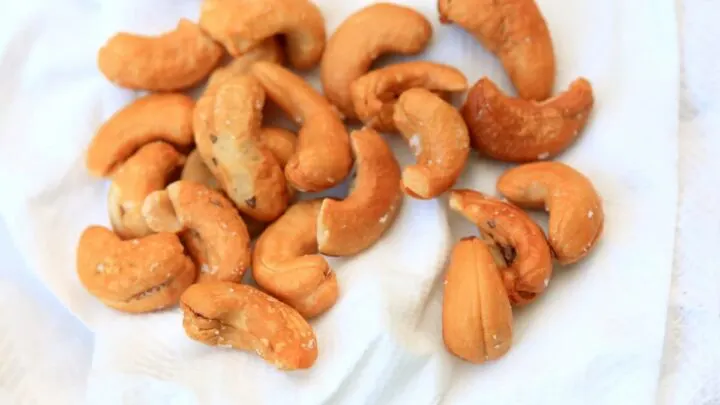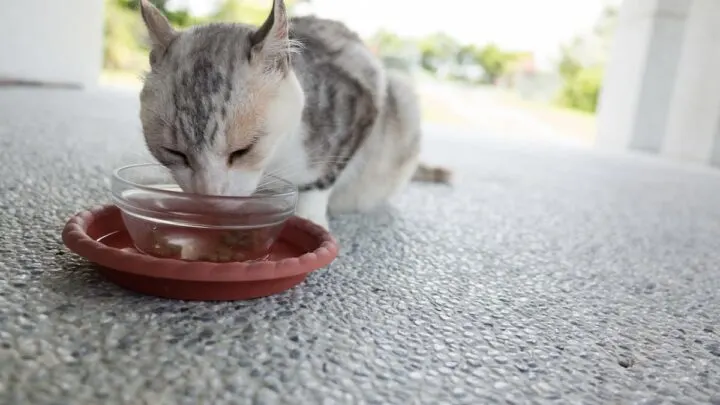Everyone hears about how healthy nuts are for you, especially when you’re on a diet, but you can’t help but wonder if that’s also the case for cats. As you’re popping a handful of cashews into your mouth as a quick snack, you start to wonder: can cats eat cashews?
Cats can safely eat cashews. However, cats should eat cashews in small amounts due to their high fat and sodium content. Cashews also present a choking hazard to cats. Cashews also offer minimal health benefits and should generally be avoided.
As with many foods, cashews are not deadly to cats, but they are not healthy either. You are not helping or hurting your cat by feeding them cashews. To stay as safe as possible, you should pass on giving your cat cashews. If you want to learn more about how cashews affect your cat, keep on reading!

Are Cashews Toxic To Animals
Cashews aren’t toxic to animals or cats in particular.
Toxic foods can easily poison and kill your cat. If you do not get speedy medical attention for your cat, your cat can unfortunately die.
Even with medical care, it can be difficult for your cat to recover fully.
When it comes to cashews, you don’t have to worry about the toxicity of the nut. Cashews aren’t toxic to cats.
Just because cashews aren’t toxic doesn’t mean that they are automatically healthy for cats to eat.
Your cat won’t die after eating a cashew, but you won’t see any health benefits after your cat eats them either.
Cashews and other nuts can quickly become something that creates a host of other health issues that can be difficult to link to the consumption of nuts.
Since cats do not need to have nuts in their diet, it is better to avoid them altogether.
Can Cats Eat Roasted Cashews
You should not give your cat roasted cashews to eat.
We’ve already covered the fact that cashews aren’t deadly to cats; however, you might wonder if roasted cashews are any better for cats.
I would advise against feeding your cat roasted cashews.
Roasted cashews, or any roasted nuts for that matter, are often saltier for a great taste – for humans at least. If the roasted cashews aren’t flavored with salt, there may still be some other seasoning to give them a bold flavor.
The additional salt on the outside of the nut is not suitable for your cat. Therefore, it makes the cashew even worse for your cat to be eating.
If you only take away one thing from this article, make note that the way nuts are cooked does not make the nuts any healthier for your cat.
Why Are Cashews So Bad For Cats
Cashews may not be poisonous to cats, but that doesn’t mean they’re necessarily that good for them either. Below are a few key reasons why cashews are bad for cats in general:
High Salt Content
Like most types of nuts, cashews can be super high in salt content. Many times this salt is added after the fact for taste. Some brands add as much as 12m of salt per 100 grams. For a cat that’s way more than they can safely consume in any period, and could lead to salt poisoning.
Choking Hazard
Cashews are quite large in size and oddly shaped. If your cat does not get their teeth around the nut well enough and try to swallow it; well, that can definitely lead to choking. If you do decide to feed your cat cashews in any kind of form, be sure to break them down into small, easy-to-eat pieces.
That way if your cat slurps it up, it can at least pass through its throat without getting stuck. If you are not sure what size to break it down to, have a look at your cat’s dry food and make something of a similar size.
Leads To Pancreatitis
While pancreatitis is one of the more rare side effects of eating cashews in cats, it can happen if they eat them regularly over the long term.
If you notice your cat is suffering from pancreatitis you’ll likely see the following symptoms:
- Vomiting
- Diarrhea
- Abdominal pain
- Appetite loss
- Fever
- Lethargy
- Pain in the abdomen
So, if your cat is letting out an odd meow (possibly one indicating pain), don’t ignore it. That’s probably a sign something is wrong due to the cashews.
Cashews Might Cause An Allergic Reaction
Allergic reactions are no fun for cats, and it’s entirely possible for cashews to cause them (although extremely rare). Much of this stems from the seasoning on the cashews. That seasoning can actually trigger allergic reactions and then other ailments will follow. This includes things like upset stomach, diarrhea, and so forth.
Can Cats Have Cashew Milk
Cats can have cashew milk, however in small amounts.
We definitely wanted to address this point, because although cashew milk is a different form of the snack, it’s essentially the same thing. It contains the same harmful salt content and it’s also high in fat. However it is a non-lactose version and an alternative drink cats can safely consume.
What Nuts Are Poisonous To Cats
Let’s cover more than poisonous nuts here. This list includes some of the nuts that you shouldn’t feed your cat.
- Macadamia nuts can cause vomiting, lethargy, and even tremors in severe cases.
- Almonds can lead to pancreatitis if too many are eaten.
- While healthy for humans, Pecans and walnuts can be tough on your cat’s digestive system and cause your cat to throw up.
- Hazelnuts and pistachios can become a choking hazard because they are so small.
- Peanuts are high in fat like all nuts, but they are also covered in salt than other nuts.
As we can see from this list, there are no cuts that are going to be toxic to your cat, but that doesn’t mean that nuts are healthy to eat.
Aside from the fat content, nuts are often covered in salt or other seasonings.
Additionally, most nuts are small and can become a choking hazard for your cat, which is something you may not have considered before!

What Nuts Can Cats Have
There are very few nuts that are healthy for your cat to eat. Overall, you should avoid feeding your cat any type of nut.
Nuts are high in fat. While this is a good human diet, this is the exact thing that makes nuts dangerous to your cat.
Added fat can cause your cat to gain weight. A few extra pounds on a cat can have severe consequences.
A cat that is too heavy is at greater risk of getting diabetes or pancreatitis.
Here you can see why toxicity is not the only concern when it comes to feeding your cat foods that are generally reserved for people.
If you want to give your cat a nut, try a chestnut because they are low in fat, which can be dangerous to cats.
What Happens If A Cat Eats A Nut
Eating one nut won’t necessarily harm your cat because nuts are not toxic, but prolonged consumption of nuts can lead to severe issues in cats.
As we have covered already, nuts are high in fat, which can lead to weight gain.
Weight gain of any kind can lead to diabetes in cats. Since cats are so small, additional weight can quickly become a problem.
One of the main concerns that can come from nuts is pancreatitis, which is a condition where the pancreas becomes inflamed and enlarged.
With early detection and treatment, cats can recover from pancreatitis. The earlier that the pancreatitis is diagnosed and treated, the better your cat’s life will be following the diagnosis.
Your cat probably won’t have any long-term consequences from pancreatitis.
Although pancreatitis isn’t a bleak prognosis, it can be painful for your cat and expensive to treat.

My name is James, and welcome to FAQCats!
Along with our team of cat owners, expert pet enthusiasts, and pet professionals, we aim to write engaging helpful, engaging content about cats. At FAQCats we strive to provide content that’s accurate and fun to read. Our team writes about everything related to cats; even the most complex of topics. Through extensive research and caring for our own fur-pals, we’re able to provide something cat owners worldwide will love. Have a look around, and leave us feedback anytime!
